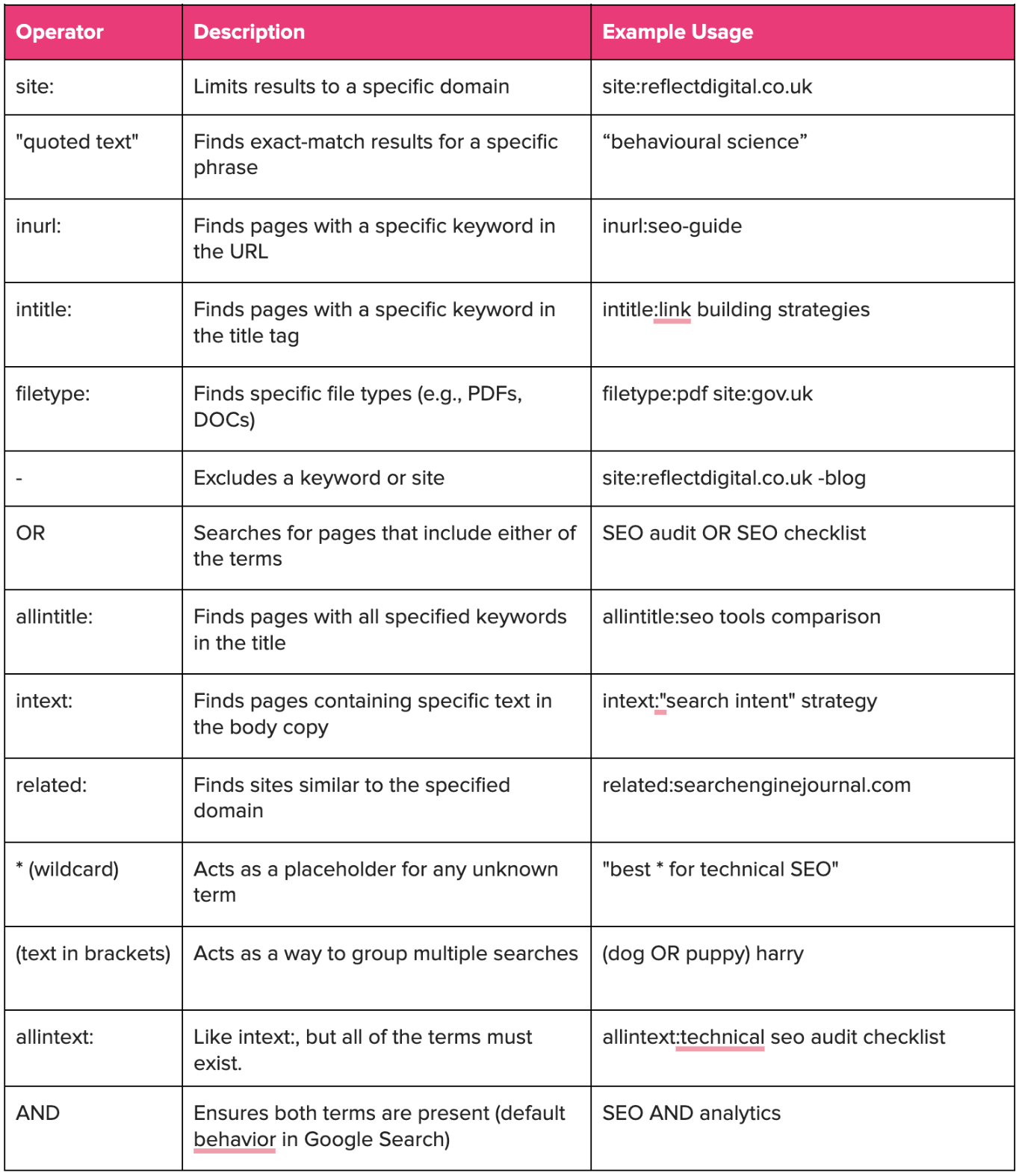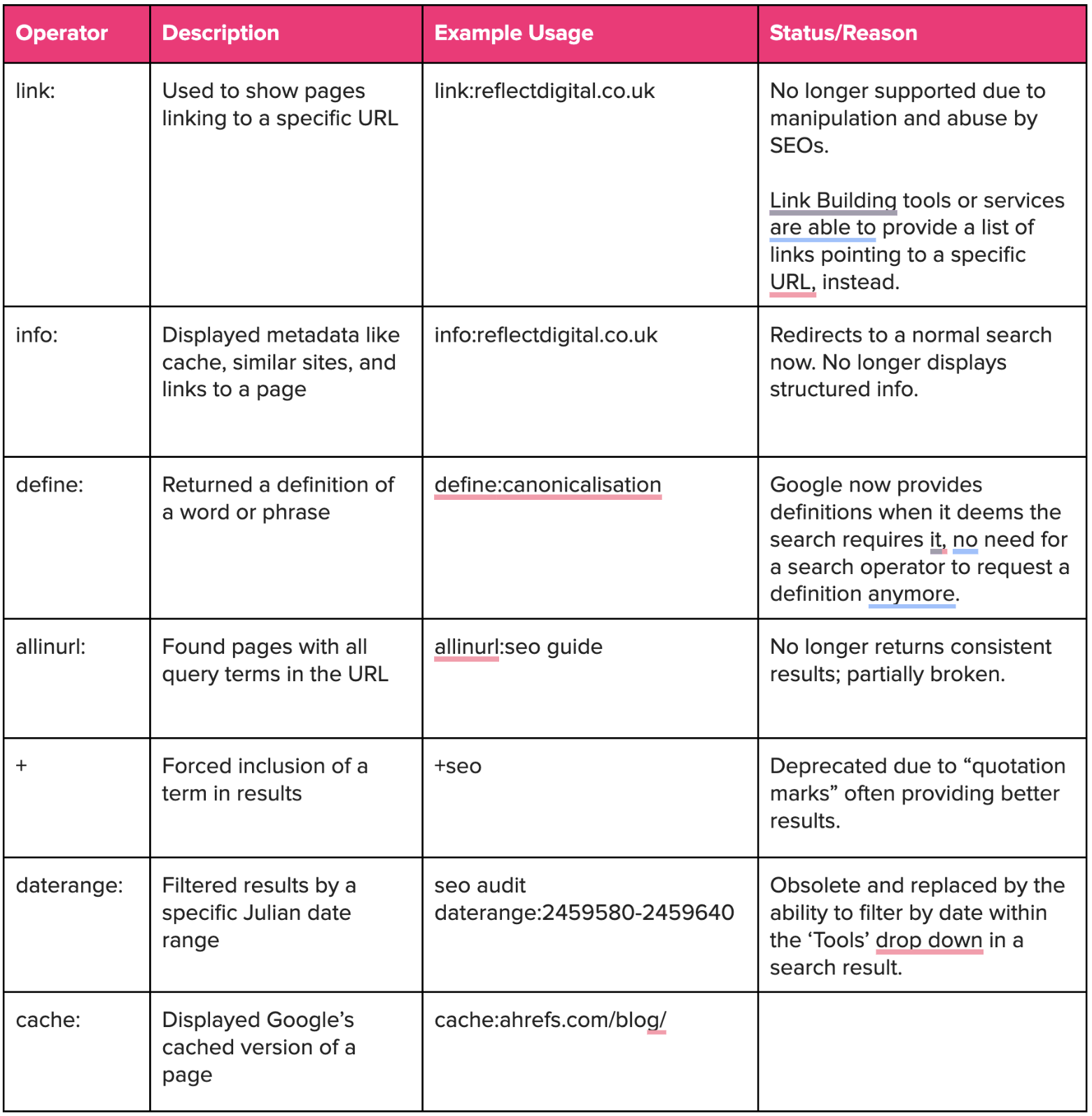Advanced search operators are powerful commands that extend the capabilities of Google Search beyond basic keyword queries. Having a basic understanding of search operators can be crucial for competitive analysis, content auditing, link prospecting, and technical website analysis. By using search operators directly within the Google search bar, results can be much more refined, and uncover content opportunities that would otherwise be buried.
Whether you're reverse-engineering a competitor's outreach tactics, identifying duplicate content on your own website, or simply trying to find an article that you forgot to bookmark - search operators can make your search results much more efficient and ultimately easier to find what you need.
They’re not scary or complicated, in fact, they’re really easy to use - you just need to know how. Our guide below will give you the starting point for you to be able to start using search operators in your day-to-day marketing and research.
Cheat Sheet: Current Google Search Operators
The following is a complete and up-to-date list of all Google Search Operators that are currently functional and reliably working in Google Search as of 2025. Each operator in the table includes a description and a usage example.

Note: Google occasionally deprecates or restricts certain operators. While the above list is accurate, operators may behave inconsistently based on algorithmic changes or index limitations.
No Longer Working: Deprecated or Defunct Search Operators
Below is a list of previously available Google Search Operators that no longer work as expected or have been fully deprecated. Avoid relying on these, but it’s worth being aware of them in the event of them being brought back into operation again in the future.

Search Operator Examples: Practical Use Cases
Google Search Operators are not just for technical SEOs - they’re incredibly useful for content marketers, digital PR professionals, digital strategists, and anyone who needs to extract targeted information from search results.
Below are five real-world examples of how search operators can be used to improve your research, outreach, and campaign planning - but these are just some common examples, so try them for yourself!
1. Using inurl: to Find Contribution or Collaboration Pages
Looking for places that accept guest posting? Use inurl: to discover websites actively seeking contributors or collaborators. Combine it with a site: operator or a “quotation marks” operator to refine your search based on topics or markets.
inurl:write-for-us “seo” site:.co.uk
This helps to easily locate niche industry sites open to guest articles, interviews, or partnerships.
2. Using intitle: to Research Competitor Content Strategies
If you're doing content research and want to see how others are framing topics in titles:
- intitle:"2025 marketing trends"
This is useful for identifying trending formats, headlines, or themes in your space.
3. Using Quotation Marks to Find Exact-Match Phrases
Want to check if a press release or a quote has been picked up? Or worried that other websites are copying your content? Use “quotation marks” to search for specific phrases.
- "New product launch will redefine customer experience"
This is a quick way to track media coverage or detect content reuse.
4. Using filetype: to Locate Downloadable Resources
If you're building a market analysis or competitor intel report, search for PDFs or PowerPoints from public sites:
- filetype:pdf site:.gov "social media statistics"
Great for finding official whitepapers, research documents, and public data.
5. Combining Operators to Curate Specific Lists
Need to find blog posts that mention two concepts relevant to your campaign?
- intext:"customer loyalty" AND "email marketing"
This filters results down to only those that mention both, helping with research or inspiration for new content angles.
6. Finding Staging Websites That Shouldn’t Be Indexed
Worried that your pre-launch website or a non-public subdomain has been indexed accidentally?
- site:reflectdigital.co.uk -inurl:www
This looks for subdomains that aren’t “www.” - meaning that if you had ‘test.yourwebsite.com’ for example, it would be displayed in this search result if Google knew about it.
7. Finding “Lorem Ipsum” Text On Your Website
Need to find pages where text ‘lorem ipsum’ text has been left in place, but you don’t know where?
- site:reflectdigital.co.uk “lorem ipsum”
This looks for pages on a specific website that include the famous “lorem ipsum” wording. Note that you could also try searching for “test” or inurl:test to find test pages that should not be active.
These use cases demonstrate how advanced search operators can enhance workflows across content marketing, outreach, public relations, and strategy development - not just technical SEO. By mastering even a few of these, marketers can gain faster, more precise insights in a fraction of the time.
Key Takeaways
Google Search Operators are powerful tools that extend far beyond technical SEO. Whether you're a content marketer researching industry trends, a PR professional tracking brand mentions, or a digital strategist identifying partnership opportunities, these operators can help you surface highly specific and relevant information quickly.
By mastering even a handful of these commands, you can streamline your research process, uncover valuable insights, and make more informed marketing decisions. As with any digital toolset, staying familiar with what works - and how to apply it creatively - gives you a distinct edge in an increasingly data-driven landscape.
Need help with your SEO strategy? Speak to our SEO team today.
Contact Us
MEET THE AUTHOR.
ANDY MOLLISON
Andy drives high-quality, high-converting organic traffic to a wide range of businesses, from local companies to global brands.
A strategic search marketer, Andy’s expertise lies predominantly in e-commerce SEO services, websites and technical SEO, and is particularly adept at finding opportunities to provide quick wins and long-term return on investment.
More about Andy






















